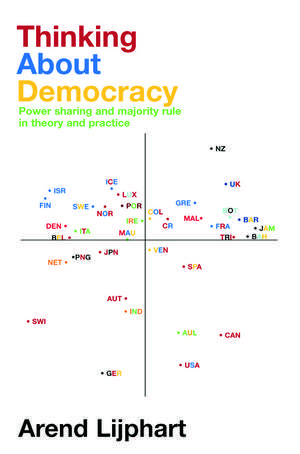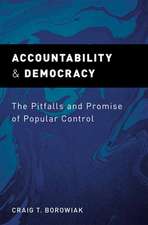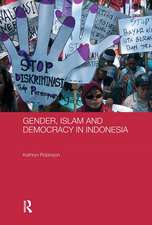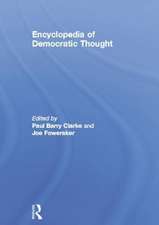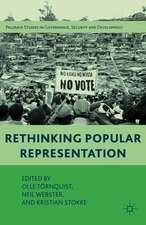Thinking about Democracy: Power Sharing and Majority Rule in Theory and Practice
Autor Arend Lijpharten Limba Engleză Paperback – 27 sep 2007
Thinking about Democracy draws on a lifetime's experience of research and publication in this area and collects together for the first time his most significant and influential work. The book also contains an entirely new introduction and conclusion where Professor Lijphart assesses the development of his thought and the practical impact it has had on emerging democracies.
This volume will be of enormous interest to all students and scholars of democracy and comparative politics, and politics and international relations in general.
| Toate formatele și edițiile | Preț | Express |
|---|---|---|
| Paperback (1) | 349.29 lei 3-5 săpt. | +23.40 lei 7-13 zile |
| Taylor & Francis – 27 sep 2007 | 349.29 lei 3-5 săpt. | +23.40 lei 7-13 zile |
| Hardback (1) | 1060.11 lei 6-8 săpt. | |
| Taylor & Francis – 27 sep 2007 | 1060.11 lei 6-8 săpt. |
Preț: 349.29 lei
Nou
66.83€ • 69.78$ • 55.32£
Carte disponibilă
Livrare economică 14-28 martie
Livrare express 28 februarie-06 martie pentru 33.39 lei
Specificații
ISBN-10: 0415772680
Pagini: 316
Ilustrații: 6 black & white illustrations, 6 black & white tables, 6 black & white line drawings
Dimensiuni: 156 x 234 x 18 mm
Greutate: 0.47 kg
Ediția:1
Editura: Taylor & Francis
Colecția Routledge
Locul publicării:Oxford, United Kingdom
Public țintă
Postgraduate and UndergraduateCuprins
Part 1: Introduction 1. Developments in Power-Sharing Theory and Practice Part 2: Consociational and Consensus Democracy 2. "Consociational Democracy," World Politics, January 1969 3. "The Puzzle of Indian Democracy: A Consociational Interpretation," American Political Science Review, June 1996 4. "Constitutional Design for Divided Societies," Journal of Democracy, April 2004 5. "Self-Determination Versus Pre-Determination of Ethnic Minorities in Power-Sharing Systems" in David Schneiderman, ed., Language and the State: The Laws and Politaics of Identity, Cowansville, Quebec: Éditions Yvon Blais, 1991 6. "The Quality of Democracy: Consensus Democracy Makes a Difference," Chapter 16 of Patterns of Democracy: Government Forms and Performance in Thirty-Six Countries, New Haven: Yale University Press, 1999 Part 3: Majority Rule 7. "Majority Rule in Theory and Practice: The Tenacity of a Flawed Paradigm," International Social Science Journal," August 1991 8. "Back to Democratic Basics: Who Really Practices Majority Rule?", in Axel Hadenius, ed., Democracy’s Victory and Crisis, Cambridge: Cambridge University Press, 1997 Part 4: Presidential vs. Parliamentary Government 9. "Presidentialism and Majoritarian Democracy: Theoretical Observations," in Juan J. Linz and Arturo Valenzuela, eds., The Failure of Presidential Democracy, Baltimore: Johns Hopkins University Press, 1994. 10. "Europe, the European Union, and Democracy," NIAS Newsletter, Spring 2002 Part 5: Proportional vs. Majoritarian Election Systems 11. "Constitutional Choices for New Democracies," Journal of Democracy, Winter 1991 12. "Double-Checking the Evidence," Journal of Democracy, Summer 1991 13. "The Alternative Vote: A Realistic Alternative for South Africa?", Politikon, June 1991 14. "Electoral Engineering: Limits and Possibilities," Chapter 7 of Electoral Systems and Party Systems: A Study of Twenty-Seven Democracies, 1945-1990, Oxford: Oxford University Press, 1994 Part 6: Conceptual Links to the Fields of Political Behavior, Foreign Policy, and Comparative Methodology 15. "Unequal Participation: Democracy’s Unresolved Dilemma," American Political Science Review, March 1997 16. "Types of Democracy and Generosity with Foreign Aid: An Indirect Test of the Democratic Peace Proposition" (with Peter J. Bowman), in Erik Beukel, Kurt Klaudi Klausen, and Poul Erik Mouritzen, eds., Elites, Parties and Democracy, Odense, Denmark: Odense University Press, 1999 17. "Comparative Politics and the Comparative Method," American Political Science Review, September 1971 Part 7: Conclusion 18. Conclusions: Power-Sharing and the Future of Democracy Part 8: Bibliography
Recenzii
Larry Diamond, Senior Fellow, Hoover Institution, Co-editor, Journal of Democracy
Arend Lijphart's work has always been intellectually first class. Thinking about Democracy assembles the cream of his essays on power- sharing and comparative political analysis of the last forty years, and crowns them with fresh appraisals and commentary. Engaged with both major intellectual and policy problems these chapters display why he is widely and rightly regarded as the world's premier political scientist of democracy of the last fifty years. Current students and readers alike, will be delighted that these essays are brought together in this compact and well-organized collection that is sure to be reprinted many times in the decades ahead.
Brendan O'Leary, Lauder Professor of Political Science, University of Pennsylvania, USA
It is fascinating to have in one volume the main stations in the broad based intellectual career of Arend Lijphart. His key question was always how to construct the best possible democratic institutions, an endeavour that he accomplished with great success in the political science community.
Jürg Steiner, University of North Carolina at Chapel Hill and University of Bern, Germany
Descriere
Arend Lijphart is one of the world's leading and most influential political scientists whose work has had a profound impact on the study of democracy and comparative politics.
Thinking about Democracy draws on a lifetime's experience of research and publication in this area and collects together for the first time his most significant and influential work. The book also contains an entirely new introduction and conclusion where Professor Lijphart assesses the development of his thought and the practical impact it has had on emerging democracies.
This volume will be of enormous interest to all students and scholars of democracy and comparative politics, and politics and international relations in general.
